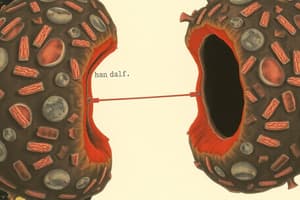Podcast
Questions and Answers
What is the term for the variety of changes a cell suffers due to environmental stress?
What is the term for the variety of changes a cell suffers due to environmental stress?
- Cell atrophy
- Cell regeneration
- Cell damage (correct)
- Cell repair
Which of the following is considered a physical agent that can cause cell injury?
Which of the following is considered a physical agent that can cause cell injury?
- Electric shock (correct)
- Nutritional deficiencies
- Free radicals
- Glucose
What occurs when a cell is damaged and cannot be regenerated?
What occurs when a cell is damaged and cannot be regenerated?
- Apoptosis of damaged cells
- Immediate repair of the original cell
- Replacement with connective tissue (correct)
- Creation of new parenchymal cells
Which factor is NOT listed as a cause of injury or stress to cells?
Which factor is NOT listed as a cause of injury or stress to cells?
What is the primary purpose of the body's response when a cell becomes damaged?
What is the primary purpose of the body's response when a cell becomes damaged?
What is the main purpose of cellular adaptation?
What is the main purpose of cellular adaptation?
Which of the following describes hypertrophy?
Which of the following describes hypertrophy?
What triggers physiologic hyperplasia?
What triggers physiologic hyperplasia?
Which adaptation is characterized by the disordered growth of cells?
Which adaptation is characterized by the disordered growth of cells?
What is an example of pathologic hypertrophy?
What is an example of pathologic hypertrophy?
Which type of cellular adaptation is reversible and involves replacement of one cell type with another?
Which type of cellular adaptation is reversible and involves replacement of one cell type with another?
What is a common cause of atrophy in cells?
What is a common cause of atrophy in cells?
Which adaptation type is associated with an increase in cell number?
Which adaptation type is associated with an increase in cell number?
Flashcards are hidden until you start studying
Study Notes
Cellular Adaptation
- Refers to changes made by a cell in response to environmental changes
- Cells can respond to various stimuli and adverse environmental changes
Types of Cellular Adaptation
- Atrophy: Reduction in cell size and number
- Hypertrophy: Enlargement of individual cells
- Hyperplasia: Increase in cell number
- Metaplasia: Transformation from one type of epithelium to another
- Dysplasia: Disordered growth of cells
- Anaplasia: Lack of differentiation in cells
- Neoplasia: Uncontrolled cell growth (cancer)
Hyperplasia
- Physiologic hyperplasia: Occurs due to a normal stressor
- Examples include breast growth during pregnancy, thickening of the endometrium during the menstrual cycle, and liver growth after partial resection
- Pathologic hyperplasia: Occurs due to an abnormal stressor
- Example includes proliferation of the endometrium due to prolonged estrogen stimulus
Hypertrophy
- Physiologic hypertrophy: Occurs due to a normal stressor
- Example includes enlargement of skeletal muscle with exercise
- Pathologic hypertrophy: Occurs due to an abnormal stressor
- Example includes increase in the size of the heart due to aortic stenosis
Atrophy
- Shrinkage in cell size by loss of cellular substance
- Can affect entire organs
- Causes include decreased workload, pressure, diminished blood supply or nutrition, loss of endocrine stimulation, and aging
Metaplasia
- Reversible change in which one mature cell type is replaced by another
- Considered a protective mechanism, not a pre-cancerous change
- Physiological metaplasia: Cervical ectopy
- Pathological metaplasia: Occurs as a response to chronic chemical or physical stimuli
- Can completely regress or lead to malignant transformation (considered precancerous)
Causes of Cell Injury
- Oxygen deprivation: Hypoxia and ischemia
- Free radicals
- Chemical agents: Glucose, hypertonic saline, increased oxygen, and poisons
- Physical agents: Trauma, extreme heat/cold, increased atmospheric pressure, radiation, electric shock
- Infections
- Immune reactions
- Genetic defects: Gene mutations, chromosomal abnormality, enzyme defects, damaged DNA, increased cell susceptibility to injury
- Nutritional defects: Decreased proteins, decreased enzymes, increased cholesterol
- Aging
Cell Damage (Cell Injury)
- Variety of changes that a cell suffers due to external and internal environmental changes
Repair
- When a cell is damaged, the body attempts to repair or replace it
- If a cell dies, the body removes it and replaces it with another functioning cell, or fills the gap with connective tissue
Regeneration
- Regeneration of parenchymal cells, or the functional cells of an organism
- The body can make more cells to replace damaged cells, keeping the organ or tissue intact and functional
Replacement
- When a cell cannot be regenerated, the body replaces it with stromal connective tissue
- Stromal cells support the parenchymal cells in any organ
Studying That Suits You
Use AI to generate personalized quizzes and flashcards to suit your learning preferences.




